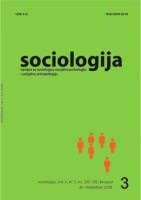Između opšteg i konkretnog: politička tolerancija i načelno prihvatanje demokratije u Srbiji i Evropi
Between the General and Specific: Political Tolerance and General Support for Democracy in Serbia and Europe
Author(s): Bojan TodosijevićSubject(s): Politics / Political Sciences
Published by: Sociološko naučno društvo Srbije
Keywords: political tolerance; democracy; Serbia; Europe; comparative analysis;
Summary/Abstract: Political tolerance is one of the basic values of a democratic society. At the same time, it is also a controversial value – political freedoms are often used to undermine democratic order. In light of the early findings of low level of political tolerance in Eastern Europe (e.g., Bahry, Boaz & Gordon, 1997; Gibson & Duch, 1993), it is important to investigate both its general level and the association with the support for general democratic norms. This paper presents results of a comparative research of political tolerance in Europe, with special focus on the situation in Serbia. The first part of the paper presents descriptive findings abut the support for general democratic norms and the degree of tolerance in approximately 30 European countries. The second part analyzes the relationships between the general acceptance of democratic norms and political tolerance, i.e., the application of the abstract norms to specific groups. The research is based on the World Values Survey data (WVS; http://www.worldvaluessurvey.org). WVS data include the so called “the least liked group” measure of political tolerance, developed by Sullivan et al. (1979, 1982). The results, once again, indicted the gap between widespread endorsement of abstract democratic norms and readiness to grant the basic political liberties to various specific political groups. Although the level of political tolerance is low across Europe, intolerance is still more widespread in East European countries. Serbian respondents appear similar to those from neighbouring countries.
Journal: Sociologija
- Issue Year: 50/2008
- Issue No: 3
- Page Range: 267-292
- Page Count: 26
- Language: Serbian

